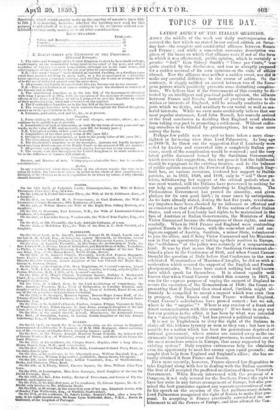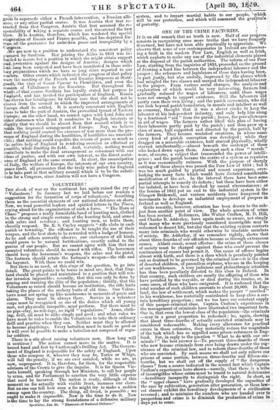TOPICS OF THE DAY.
LATEST ASPECT OF THE ITALIAN QUESTION.
ABOUT the middle of the week our daily contemporaries dis- covered the fact which we stated in our second edition on Satur- day last—the complete and confidential alliance between-Russia and France ; and while a somewhat excessive description was given of the bases on which that alliance rests if not of the form in which it was effectuated, public opinion, which is certainly a greater " fool" than Sidney Smith's " Three per Cents," was quite startled by the disclosures, and was as abruptly prepared for a sudden reversal of its own opinions on the state of affairs abroad. Now the alliance was neither a sudden event, nor did it make any essential difference in the course of action. On the contrary, it simply ratified an accord between two of the Euro- pean powers which positively prevents some disturbing complica- tions. We believe that if the Government of this country be di- rected by an intelligent and practical public opinion, the allionee between France and Russia, instead of proving adverse to the wishes or interests of England, will bo actually condueive to-ob- jects which we desire, and auxiliary to our moral at well as ma- terial interests. While we even more confidently believe that our most popular statesman, Lord John Russell, has scarcely arrived at the final conclusion in deciding that England must abstain from taking any part in promoting a settlement. Without suffer- ing ourselves to be blinded by preconceptions, let us once more survey the facts.
Perhaps few public men amongst us have taken a more dear- sighted or far-seeing view than Lord Palmerston. As long age as 1848-'9, he threw out the suggestion that if Lombardy were ceded by Austria and converted into a completely Italian pro- vince, much of the complication would be removed ; and the very latest public document issued by the Sardinian Government, which revives this suggestion, does not press it lest the fulfilment should be repugnant to the existing treaties, and to the balance of public opinion amongst the Powers of Europe. Although Eng- land has, on various occasions, tendered her support to Italian patriots, as in 1812, 1820, and 1848, only to " sell" those pa- triots, withdrawing her support at the critical periods when it was most wanted, still the Italians have persevered in seeking for our help on grounds certainly flattering to Englishmen. The. Piedmontese Government has proved its sincerity, and given pledges for its own good faith ; in some cases by anticipation. As we have already stated, during the last five years, revolution- ary impulses have been checked by no inilueuoe so effectual and! so consistent as'that of Piedmont. If the natives of other Italian States, and even of Lombardy had rights to bo maintained in the face of Austrian or Italian Governments, the Ministers of King Victor Emmanuel became the champions of those rights, and silo. cessfully. When in 1854 France and England were contending against Russia in the Crimea, with the somewhat cold and am- biguous support of Austria, Sardinia, a minor State, volunteered to join the allies, and if King Victor Emmanuel and his Ministers/. saw in that an opportunity of taking up their position in Europe, the "selfishness opportunity of the policy was certainly of a magnanimous,: kind. It was by that means policy the Sardinian. Government obi- tained a place in the Conference of 1856, and when Count Como= brought the question of Italy before that Conference in the- now, celebrated Memorandum of Massimo d'Azeglio, lie did so with a.. moderation which secured the support of the English and French plenipotentiaries. We have here stated nothing but well known . facts which speak for themselves. It is Almost equally well ' known that when Count Cavour visited this country in 180, it.: was for the express purpose of urging the support of England to secure the execution of the Memorandum of 1856; the Count re- presenting that if England then stood aloof, Sardinia might ul- - timately be compelled to accept a support which was even then in prospect, from Russia and from France without England. Count Cavour's calculations have proved correct ; but we ask, where is the " surprise" ? Where is any evasion of a frank and direct communication with this country ? If we have in any way lost our position in the affair, it has been by what was intended for a " masterly inactivity," but has proved a political mistake.
It is not in Englishmen to deny the right of the Italians skake off this hideous tyranny as soon as they can ; but how is•it. possible for a nation which has been for generations deprived of national government, whose armies are carried away. as the in.+. struments for tyranizing over distant provinces, to confront one of the meat numerous armies in Europe, that army supported by the existing system ? Italy requires extraneous help for obtaming even the opportunity to meet her enemy upon equal grounds; she sought that help from England and England's allies ; she has ac- tually obtained it from France and Russia. Even more recently, however, France showed her disposition be- take England along with. her in dealing with the Italian question. She first of all accepted the proffered mediation of Queen Victoria's Government. When Russia intervened with the- proposal of a Congress, it not only secured for the Northern Power the right to have her voice in any future arrangement of Europe, but also pro...! mised the best guarantee against any separate provocatives of ward • In his speech on the occasion of the last parliamentary debatei - Lord Palmerston recognized the right of Russia to make that pro- bitrement to all the Powers of Europe, and thus allowed the Con-
surrendered the, at-,
poeal. In accepting it Franco
gross to supersede either a French intervention, a Russian alli- ance, cr any other partial course. It was Austria that first re- tracted from that Congress, Austria that first assumed the re- sponsibility of taking a separate course and threatened the first blow. .1t,as Austria, therefore, which has rendered. the special eileper4ien of Russia and France possible, and has deprived Eu- rope ist the guarantee for unbroken peace and tranquillity by a Cerigiv,e. sWe are now in a position to understand the consistent policy pues.ued by Sardinia. Her joining the Allies in 1854 was in- tended to secure her a position in which she might obtain support ands;peeteetion against the designs of Austria ; designs which heelsiong been suspected and have been manifested in those min- t*" preparations which we have so long since reported to our re close.: Other events which indicated the progress of that policy weep the meeting of the French and Russian Emperors at Stutt- gaedt,s•the visit of Count Cavour to Plombieres, and even the ceseien. of Villafranca to the Russians. But throughout the whple of that course Sardinia has loyally stated her purpose to England, and has invited the participation of England. Russia hM;shown her intelligence by taking care that she shall not be absent from the council in which the improved arrangements of Europe shall be settled. It is scarcely consonant with English ideas to take the part of Austria, the proverbial tyrant of Eastern Europe; on the other hand, we cannot agree with Lord John and other statesmen who think it conducive to English interests or dignity that we should be absent from that council which is to settle the improved arrangement of Europe. Nay, we believe that nothing could control the excesses of war more than the pre- iienoe of England during the hostilities, if hostilities are unavoid- able; that nothing could expedite the return of peace so much as tbe ewtive help of England in rendering coercion as effectual as possible, while limiting its field. And, certainly, nothing would contribute to make the final arrangement so consonant with our ideas of justice, and with our own interest, as the direct assist- anee of England at the same council. In short, the emancipation of Italy, the welfare of Europe, the interests of our own country, peace itself, all pronounce that the truly wise policy for England is to take part in that military council which is to be the substi-
-tate for a Congress, since Austria will not have a Congress.



























 Previous page
Previous page